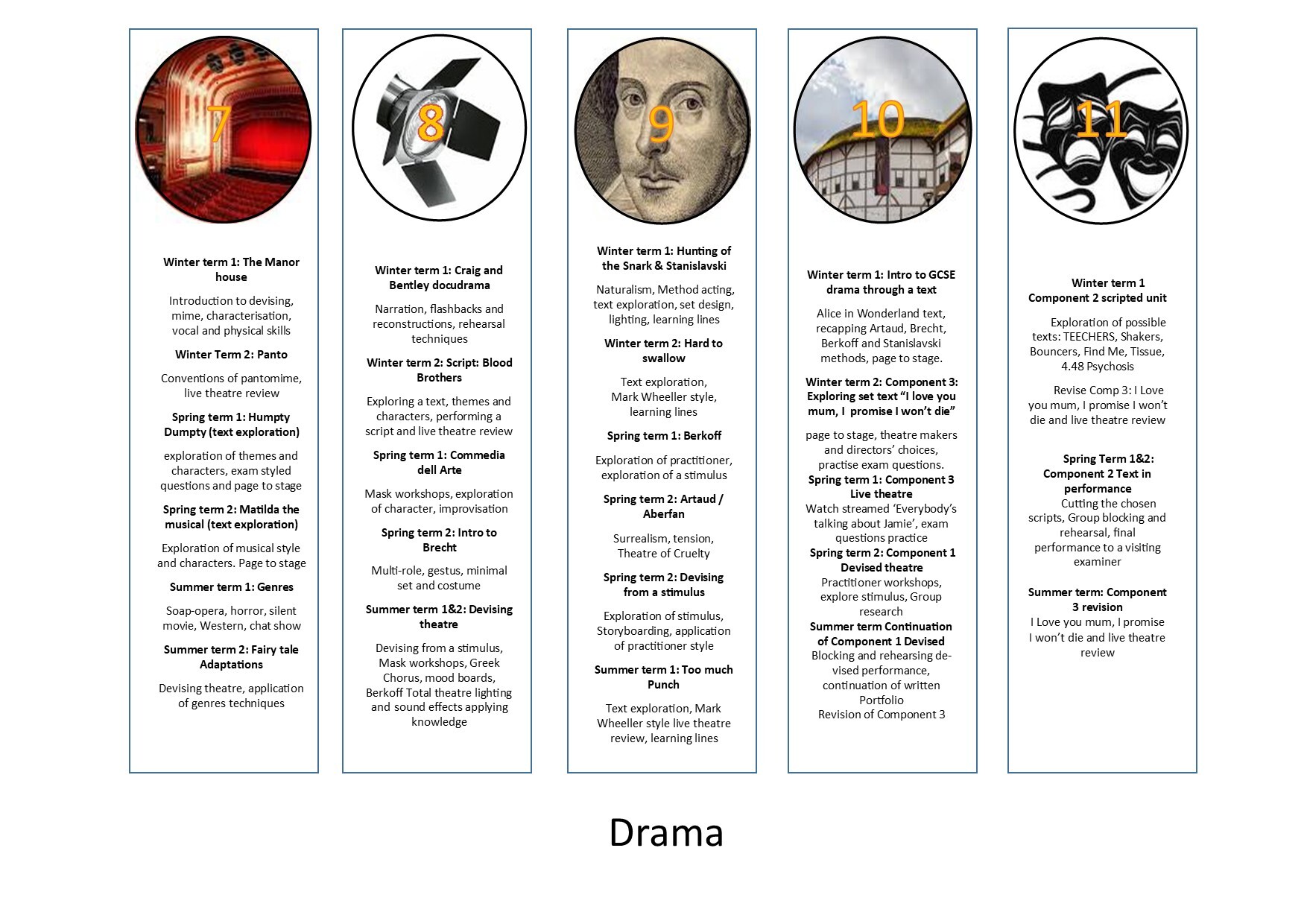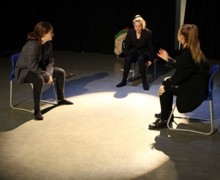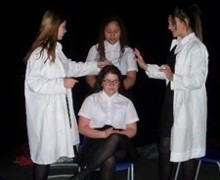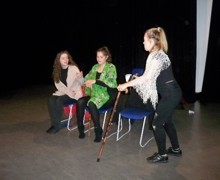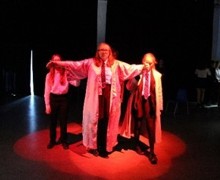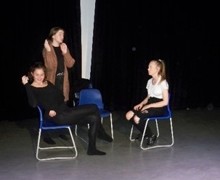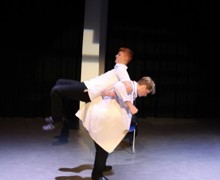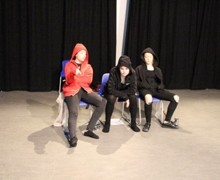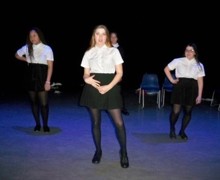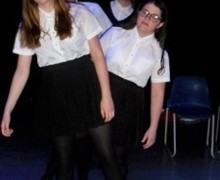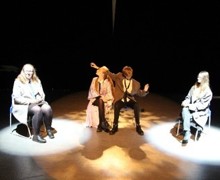- Home
- Secondary
- Subject Information
Drama
Back
Introduction
Our subject area seeks to develop the following in all our students:Vision Statement: Drama is a practical based subject that explores texts, theatre practitioners and theatrical styles and genres. We aim to give the students a wide knowledge of theatre and the importance it has in developing life skills as well as more specialised subject knowledge. The students get to explore important, hard hitting issues through the means of performance work. We want to give our students every opportunity to develop their confidence and challenge their creativity. We have a strong area and have had lots of successful performances and work hard to continue our success in the future.
The confidence to communicate and work creatively within a team of peers by:
- Regularly working in small groups in lessons
- Creating short pieces of performance work with the groups they are put in
- Being encouraged to take on roles from a range of different performance pieces
A creative approach when developing interesting theatre performances by:
- Taking part in a wide range of drama workshops in lessons
- Exploring a variety of theatre skills, techniques, style and practitioners
- Being encouraged to use imaginative theatre techniques when rehearsing performance work
The confidence to stand up and perform short pieces in front of an audience by:
- Regularly performing work back to the class during lessons
- For older students – performing work to larger audiences including friends and family
A critical nature that is able to evaluate strengths and weaknesses by:
- Evaluating own and others performance work
- By taking part in written activities that develop critical and analytical writing skills
- Listening to regular feedback from teachers or peers that will help them improve their work
Key Stage 3
Drama is a practical based subject that explores texts, theatre practitioners and theatrical styles and genres. We aim to give the students a wide knowledge of theatre and the importance it has in developing life skills as well as more specialised subject knowledge. The students get to explore important, hard hitting issues through the means of performance work. We want to give our students every opportunity to develop their confidence and challenge their creativity. We have a strong area with fantastic facilities. We have a fully equipped theatre with professional lighting rigs and projection equipment. We are very lucky to have a technician Mr Groves, who creates fantastic technical atmospheres for our performance evenings which will give our students the opportunity to experience what the theatre can be like on a professional level. The subject is taught by Mrs Rolfe and Mr Rooza who are both passionate and committed teachers who strive for excellence in our students.
The confidence to communicate and work creatively within a team of peers by:
- Regularly working in small groups in lessons
- Creating short pieces of performance work with the groups they are put in
- Being encouraged to take on roles from a range of different performance pieces
A creative approach when developing interesting theatre performances by:
- Taking part in a wide range of drama workshops in lessons
- Exploring a variety of theatre skills, techniques, style and practitioners
- Being encouraged to use imaginative theatre techniques when rehearsing performance work
The confidence to stand up and perform short pieces in front of an audience by:
- Regularly performing work back to the class during lessons
- For older students – performing work to larger audiences including friends and family
A critical nature that is able to evaluate strengths and weaknesses by:
- Evaluating own and others performance work
- By taking part in written activities that develop critical and analytical writing skills
- Listening to regular feedback from teachers or peers that will help them improve their work
KS3 Drama Curriculum
Year 7 students will study the following curriculum in drama:
|
Autumn1 – Intro to drama: Manor house |
Autumn 2 - Pantomime |
Spring 1 / Spring 2- Script: Humpty Dumpty |
Summer 1 – Genres |
Summer 2 – Fairy tale adaptations (basic devised) |
|
Creating characters / characterisation |
Linear narrative structure |
Stage directions | Soap-opera | Planning devised work |
|
Freeze frames / still images |
Stock characters |
imaginative character portrayal |
Western |
Understanding the term adaptation |
|
Thoughts aloud |
Conventions of Pantomime as a style |
showing character relationships |
Chat show |
Applying skills and techniques / genres |
|
Mime |
Structure of a script and stage directions |
Understanding status |
Game show |
Creating characters |
|
Mood / atmosphere |
Over exaggerated characterisation |
Proxemics |
Silent movie |
Applying sound to performance |
|
Basic physical theatre |
Lighting and sound roles |
Applying techniques to scripts |
Horror |
Evaluating own performance |
|
Sound-scapes |
Analysis of a performance |
Learning lines for performance |
Skills and techniques |
|
|
Vocal and Physical skills |
Scriptwriting skills |
Creating costume for characters |
Style |
|
|
Verbal and written evaluation skills |
Codes and conventions |
The year 8 students will study the following curriculum in drama:
| Autumn 1 –
‘Let him have it’ |
Autumn 2 – Brecht |
Spring 1 & 2 – Scripted Blood Brothers |
Summer 1 – Masks | Summer 2 – devising from a stimulus |
|
Naturalistic / realism |
Brecht, | Page to stage | Clocking the audience | What is a stimulus |
| Stanislavski | multi-role, | Characterisation | Trestle masks |
Planning and developing stories |
|
Emotional memory |
Exaggeration / gestus |
Showing character relationships applying techniques to scripts |
Centre of weight |
Marking the moment |
|
Imagination, belief, concentration, relaxation |
Limited costume design |
Exploration of themes |
5 golden rules of mask work |
Basic physical theatre |
|
Episodic time structure |
Breaking the 4th wall |
Atmosphere through voice and body |
Over exaggerated physical movement |
Style / practitioner / genre |
| Sound | Learning lines | Clowning |
Episodic time structure |
|
| Lighting |
Lighting and sound for atmosphere |
Evaluation of own performance |
||
|
Costume for characters |
Lighting and sound for atmosphere |
The year 9 students will study the following curriculum in drama:
| Autumn 1: Stanislavski method acting WW2 | Autumn 2: Stanislavski applied to Script: Hunting of the Snark | Spring 1: Brecht and TEECHERs | Spring 2:
Brecht and TEECHERs |
Summer 1: Devising theatre ‘Breaking news’ | Summer 2: Devising theatre ‘Breaking news’ |
|
Stanislavski naturalism |
Naturalistic characters |
Political theatre |
Social, Historical, Political and Cultural context |
Stimulus |
Performance based on a stimulus |
|
Relaxation, concentration, imagination, belief |
Set design | Epic theatre |
Character focused characterisation |
Possible news stories or topical issues |
Lights and sound |
|
emotional memory, |
Costume | Multi-role |
Thrust staging |
Physical theatre workshops |
Stylised performance |
|
Monologues/ duologues |
Detailed characterisation |
Breaking the 4th wall |
Costumes |
Marking the moment |
Understanding the devising mark scheme |
| Expressionism | Learning lines |
Exploration of themes |
Lighting and sound |
Brainstorming ideas Mood boards and story boards |
Episodic time structure |
| Magic if |
Lighting and sound for atmosphere and era |
Page to stage |
Berkoff and Artaud |
Monologues / narration |
|
| Line learning |
KS3 Drama assessments and expectations:
Students will be assessed in different ways in drama. We first of all assess their rehearsal process and their ability to work independently and creatively alongside their groups to apply skills and techniques they have learnt to create a performance piece:
| LEVEL 1 | TARGETS | LEVEL 2 | TARGETS | LEVEL 3 | TARGETS | LEVEL 4 | TARGETS |
| Rehearsal:
I can work as part of a team, staying on task most of the time during the planning and development process. |
Stay focused and do not distract others. | Rehearsal:
I can work as part of a team, occasionally contributing ideas and staying on task during the planning and development process |
Stay focused on the work when working with a team. | Rehearsal:
I am an engaged team member who contributes ideas and listens to the ideas of others during the planning and development process. |
Listen to the ideas of others. | Rehearsal:
I am a committed team member who is able to compromise their ideas with others, and lead others to achieve during the planning and development process. |
Compromise and mix ideas of the team to create a final piece. |
| Give an idea when planning and developing your ideas. | Contribute ideas when planning and developing your work. | Contribute imaginative and effective ideas. | Ensure everyone in the team has a role and a say in what happens. |
Students will then be assessed on their final performance they create. This will be performed to the rest of their class during a lesson towards the end of the term and will be assessed by the class teacher:
| Performing:
I can show some use of movement and voice when performing. |
Use basic facial expressions and body language to show a character | Performing:
I can demonstrate a role with some commitment and focus. I can show some use of vocal expression and physicality. |
Use appropriate facial expressions and body language to show a clear character | Performing:
I can create a character using vocal expression and physicality and perform confidently to the audience. |
Use posture, gestures and mannerisms to create an imaginative character | Performing:
I can perform an engaging and imaginative character using vocal expression, physicality and space. I can also show clear and appropriate reactions to other performers. |
Maintain imaginative use of posture, gesture and mannerisms which create clear character personality and emotions |
| To project voice and speak at a pace so you can be heard by the audience | To use make basic use of vocal tone to demonstrate some character emotion | To use clear range of pitch, pace and volume to create clear tone and character emotions | Maintain a range of pitch, pace and volume to create clear tone and character emotions and maintain an appropriate accent | ||||
| To face the audience most of the time | To face the audience the whole time and avoid blocking other actors | To effectively use space to demonstrate character relationships | To effectively use space to demonstrate character relationships, status and scene setting. | ||||
| To stay in character most of the time | To stay in character throughout the performance | To maintain clear character throughout the performance | To demonstrate strong technical control over the character throughout the performance |
The final area students will be assessed on is written work. All written work set will be similar to the coursework and exam styled questions that are explored in the GCSE. Some examples of this written work include:
- Questions that explore the students’ knowledge and understanding of the text we have studied
- Questions that explore the students understanding of appropriate atmospheres that should and could be created for extracts from scripts. Students will need to use descriptive language to show their creative knowledge and understanding and then be able to analyse why their opinions are correct.
- Questions that explore the student knowledge and understanding of key practitioners such as Brecht, Stanislavski, Berkoff and Artaud
- Coursework styled work includes Storyboards and annotations to accompany creative choices they have made when creating devised work
- Creations of mood boards, brainstorms and again, annotations that accompany the creative choices they have made on these illustrative materials.
- Watching live theatre clips via youtube and analyzing the creative processes used to create effective atmosphere and audience reactions
Homework in Drama
Homework expectations for drama is that all students should use their planners to record the homework set during lessons. Homework will be set every 4 weeks in drama at KS3 and could be any of the following examples:
- Written work should be neatly presented and written straight into their exercise books or neatly word processed if preferred
- Learning lines – this will be a long term homework – students will have at least 5 weeks to learn lines. This is done successfully by repetition. The students are encouraged to look at lines with someone for at least 10mins per night in order to be successful. Any parental engagement does help this process.
- Google classroom quizzes
- Collating and collecting costume, props, sound/music for final performance work
Trips and Visits
In the past we have run trips to see musicals in London. These trips will be arranged and offered to students who engage and achieve well in lessons to encourage uptake at KS4 level. Students who also take part in extracurricular clubs such as the whole school musical and the Christmas carol concert will also get an invite to these trips. We also highly recommend that students come and watch our older students performance evenings which take place throughout the academic year in our Theatre. This is a great opportunity of our younger students to gain an understanding of the expectations we set and the level of performance that is required at GCSE and A level Drama.
Useful links to help your students at home:
- For Brecht:
- For Stanislavski:
- For Physical theatre / Artaud / Berkoff:
- You tube also has videos of some live performance that will help 8’s through their scripted units of Blood Brothers:
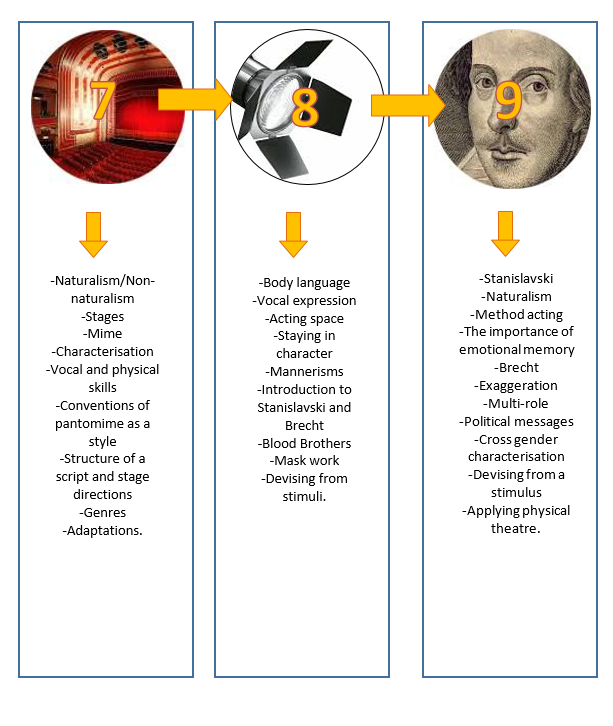
Key Stage 4
GCSE Drama at Cecil takes everything that was learnt at KS3 and develops and further challenges students creative abilities. We study the Eduqas Drama exam board which enables to students to experience a wide range of performance texts and styles. We are very lucky to have a technician Mr Groves, who creates fantastic technical atmospheres for our performance evenings which will give our students the opportunity to experience what the theatre can be like on a professional level.
The confidence to communicate and work creatively within a team of peers by:
- Regularly working in small groups in lessons
- Creating polished performance work with groups they are put in
- Being encouraged to take on roles from a range of different performance pieces
A creative approach when developing interesting theatre performances by:
- Taking part in a wide range of drama workshops in lessons
- Exploring a variety of theatre skills, techniques, style and practitioners
- Being encouraged to use imaginative theatre techniques when rehearsing performance work
The confidence to stand up and perform short pieces in front of an audience by:
- Regularly performing work back to the class during lessons
- For older students – performing work to larger audiences including friends and family
A critical nature that is able to evaluate strengths and weaknesses by:
- Evaluating own and others performance work
- By taking part in written activities that develop critical and analytical writing skills
- Listening to regular feedback from teachers or peers that will help them improve their work
KS4 Drama Curriculum
Year 10 students will study the following curriculum in drama:
| Autumn 1 Hard to Swallow (exam text) | Autumn 2 Hard to Swallow continued | Spring 1 commedia dell ‘arte workshops | Spring 2 physical theatre / Frantic assembly and Berkoff | Summer 1&2 Devised unit Component 1 |
| Study of exam text | Rehearsals (page to stage) | Challenging society through comedy | Hymn hands | Stimulus |
| Understand the themes | Set design | Mask | Threading | Brainstorming ideas |
| Explore Brechtian rehearsal techniques | Costume | Clocking | Stage combat | Planning storyboards |
| Links between Wheeler’s style and Brecht’s techniques | Characterisation | Clowning | Chair duets | Portfolio mood boards |
| Rehearsals | Learning lines | Exaggeration | Lifts | Blocking & rehearsing |
| Teacher directed | Lighting and sound for atmosphere and era | Social, Historical, Political and Cultural context | Repetition | Applying appropriate style / practitioner |
| Practise questions (theory practise) | Performance of set text to embed knowledge and understanding | Characters and class | Touch reaction | Considering sound and light |
The year 11 students will study the following curriculum in drama:
| Autumn 1 completion of devised unit (performance) | Autumn 2 update any devised portfolio, revising Hard to swallow, researching scripts | Spring 1 Scripted unit Component 2 | Spring 2 Scripted unit Component 2 | Summer Revision for Component 3 |
| Costume | Update devised portfolio (worth 40%) | Cutting scripts | Rehearsals | Hard to swallow |
| Lights and sound | Complete final evaluation | Delegating roles | In depth characterisation | Woman in black |
| Rehearsals | Revise hard to swallow and woman in black | Blocking and rehearsing | Well applied skills techniques etc. | Past papers |
| Final performance (recorded) | Researching scripts | Artistic intentions | Sound and lights | Practise questions |
| Performances observations sheets | Identifying performance strengths | Applying appropriate skills, techniques, practitioner methods | Artistic intentions form for examiner | Timing of exam |
| Complete portfolio | Identifying styles within scripts | Learning lines | Final performance to visiting examiner (could be before or after Easter) | Useful quotes and pages |
| Final written evaluation (may be completed in first week back after half term) | Getting into groups for scripted unit |
KS4 Eduqas Drama assessments and expectations:
There are 3 components to the Eduqas GCSE course which are listed below. For component 3, the students will study and answer questions on the play Hard to Swallow in Section A and for Section B, the live theatre review we usually take the students to see the Woman in Black in the Westend.
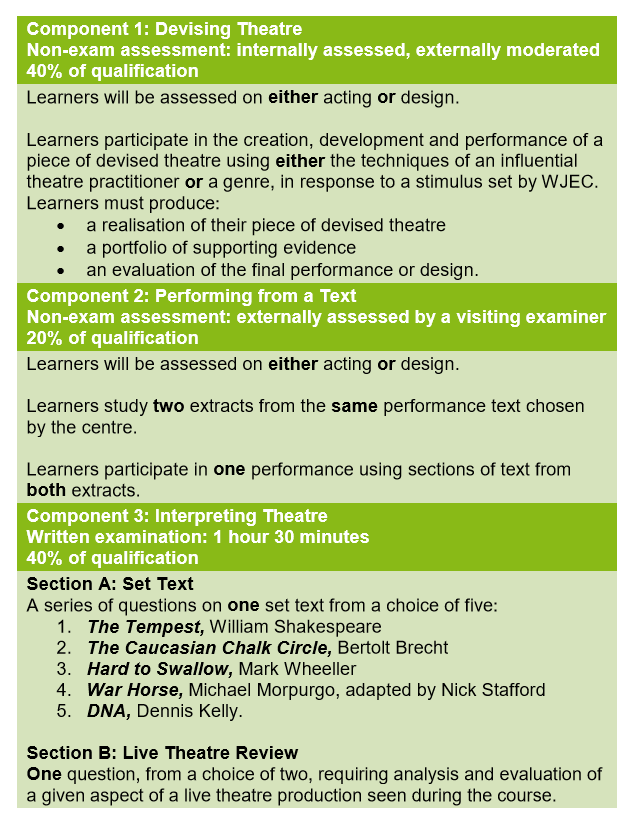
Homework in Drama
Homework expectations for drama is that all students should use their planners to record the homework set during lessons. Homework will be set every week, some examples of homework set are:
- Written research on practitioner / themes of the play which should be neatly presented and written straight into their exercise books or neatly word processed if preferred
- Coursework corrections and exam practice questions
- Learning lines – this will be a long term homework – students will have at least 5 weeks to learn lines. This is done successfully by repetition. The students are encouraged to look at lines with someone for at least 10mins per night in order to be successful. Any parental engagement does help this process.
- Collating and collecting costume, props, sound/music for final performance work
Trips and Visits
We run a trip to see The Woman in Black every year for the students to prepare them for Section B in Component 3 in the GCSE. We take the A level students to see other plays, some plays we have seen in the past for the A level include ‘The Curious Incident of the dog in the night-time’, ‘War Horse’ and ‘Things I know to be true’. We also highly recommend that students come and support the other KS4 and 5 students performance evenings which take place throughout the academic year in our Theatre
Useful links to help your students at home:
- For Brecht:
- For Stanislavski:
- For Physical theatre / Artaud / Berkoff:
- You tube also has videos of some live performance that will help 8’s through their scripted units of Blood Brothers:
https://www.youtube.com/watch?v=A9mbfRiZ2Bk&t=2s
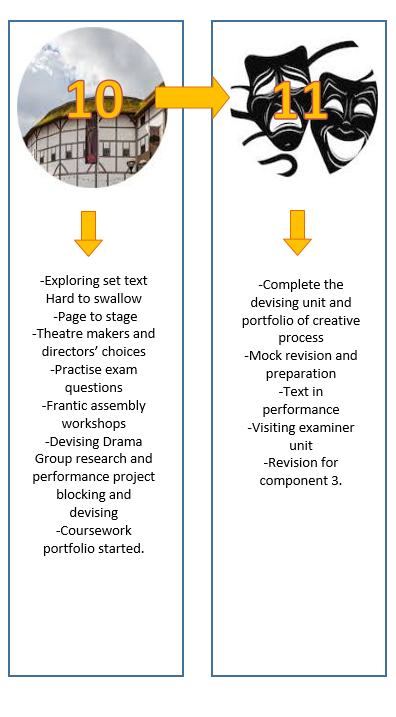
Visual Curriculum Map
